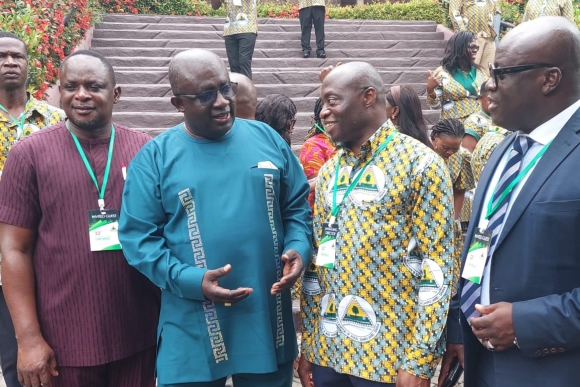RCBs urged to position themselves in national financial agenda

“The Bank of Ghana’s 2023 FinTech Sector Report indicates that mobile money accounts have surpassed 65 million with transaction values exceeding GH¢1.9 trillion.
To position rural banking at the center of the national financial inclusion agenda, RCBs can adopt technology and digitalisation in their operations,” she said in her quest to paint a picture about the value of technology and digitalisation.
In an address read on her behalf at the 23rd Annual CEOs Conference of Rural and Community Banks at Ho in the Volta Region yesterday on the theme “Positioning Rural Banks at the centre of national financial inclusion agenda”, Ms Awadzi said, BoG has emphasised digital transformation as a critical pathway for expanding rural financial services.
“Therefore, RCBs can integrate mobile banking and other digital solutions in their operations to enhance access, quality and usage of their services.
The GhanaPay initiative is a significant step in this direction, enabling RCBs to offer mobile wallets and digital payments. RCBs must capitalise on this and encourage partnerships with FinTechs through Apex Bank to innovate further,” she added.
Network
The 2nd Deputy Governor said the number and locations of RCBs across the country are essential to the economic growth of rural Ghana because the 147 RCBs and 850 outlets, serve as the primary access point for many underserved communities.
In spite of that, she said “there is still a gender gap in financial access. According to the Findex 2021 Report, women are 10 percentage points less likely to own a mobile phone compared to men, limiting their ability to access mobile money services.
This gender disparity presents a challenge that RCBs must address by creating products and services that target women and other underserved populations.
Products
“Therefore, RCBs must offer tailored financial products to their customers which fully meet the needs of their communities.
RCBs must go beyond offering generic products as their success hinges on understanding and catering to the unique financial needs of rural populations including farmers, small-scale traders, especially women and persons with disabilities, and local businesses,” she added.
According to her, by designing tailored financial solutions specific to local income cycles, RCBs can make themselves the first point of call for customers seeking financial services adding that: “Customised products will build trust and ensure a deeper connection with their clientele.”
Customer service
Furthermore, Ms Awadzi said the operations of RCBs should be made more customer centric.
She said placing the customer at the centre of operations is key to the long- term success of rural banks.
“This involves focusing on personalised service, actively listening to customer feedback, and ensuring that financial solutions are accessible and beneficial. RCBs should implement customer satisfaction mechanisms that allow for continuous service improvement.
Additionally, the Bank of Ghana would encourage RCBs to focus on local outreach. RCBs have a unique mandate to serve the unbanked and underserved populations within their localities,” Ms Awadzi added.
She said the focus on reaching out to the unbanked, rather than venturing into cities where they face competition from established banks, is crucial.
Digital banking platforms
Managing Director of the ARB Apex Bank, Alex Kwasi Awuah, said the new frontier of revolutionising financial intermediation is through the establishment of robust digital banking platforms.
“I am very pleased that our long-awaited Financial Sector Development Project (FSDP), which was sponsored by the Government of Ghana and the World Bank, has crystallised, making the digital banking platforms of the rural banking industry now operational.
“Currently, by signing onto our special USSD code *992#, customers of our banks can perform a host of banking services, including withdrawal of funds, transfer of funds, bill payments, and making account statement and cheque requests, amongst others, right from the comfort of their mobile phones. Additionally, the RCB Mobile Banking App is now ready to be deployed,” he disclosed.
Mr Awuah further announced that the pilot phase of the USSD platform has already enrolled 81,246 customers of RCBs and also recorded 694,221 transactions with a total value of GH¢323,179,429.80.
NEWS |
| News & Reports |